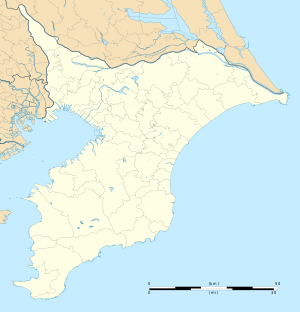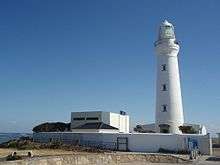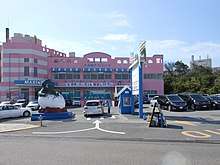Inuboh Station
Inuboh Station (犬吠駅, Inubō-eki) is a railway station on the privately operated Chōshi Electric Railway Line in Chōshi, Chiba, Japan.
Inuboh Station 犬吠駅 | |
|---|---|
Inuboh Station forecourt in August 2012 | |
| Location | 9591–1 Inubōzaki, Chōshi-shi, Chiba-ken Japan |
| Coordinates | 35°42′23″N 140°51′40″E |
| Operated by | Chōshi Electric Railway |
| Line(s) | Chōshi Electric Railway Line |
| Distance | 5.5 km from Chōshi |
| Platforms | 1 side platform |
| Tracks | 1 |
| History | |
| Opened | December 1913 |
| Previous names | Tōdaimae (until 1941) |
| Traffic | |
| Passengers (FY2010) | 158 daily |
| Location | |
 Inuboh Station Location within Chiba Prefecture  Inuboh Station Inuboh Station (Japan) | |
Lines
Inuboh Station is served by the 6.4 km (4.0 mi) Chōshi Electric Railway Line from Chōshi to Tokawa. It is located between Kimigahama and Tokawa stations, and is a distance of 5.5 km from Chōshi Station.[1]
Station layout
The station is staffed during the daytime, and consists of one side platform serving a single track.[1] Nure senbei (moist senbei rice crackers) are made and sold inside the large Portuguese-style station building.[2]
Former Choshi Electric Railway DeHa 501 EMU car was sectioned and grounded in front of the station together with former Sagami Railway 2000 series EMU car MoNi 2022. These were used as shop and restaurant facilities until they were cut up on-site in July 2012 due to their increasingly poor structural condition.[3][4]
- Former DeHa 501 car (left) and Sagami Railway MoNi 2022 car (right) in front of the station in November 2009
- The platform looking southward toward Tokawa in September 2012
History
Inuboh Station first opened in December 1913 as a station on the Chōshi Sightseeing Railway (銚子遊覧鉄道, Chōshi Yūran Tetsudō), which operated a distance of 5.9 km between Chōshi and Inuboh.[5] The railway closed in November 1917,[5] but was reopened on 5 July 1923 as the Chōshi Railway.[1] The original station was located 400 m south of the location of the present-day Inuboh Station.[6] On 21 June 1935, a new temporary station opened at the present-day station of Inuboh Station, named Tōdaimae Station (燈台前駅, lit. "lighthouse front"). This became a full-time station from 14 August 1935. With the opening of Tōdaimae Station, passenger usage of the original Inuboh Station dropped from an average of 30 passengers daily in 1930 to an average of just 13 passengers daily. The original Inuboh Station closed from 15 November 1941, from which date Tōdaimae Station was renamed Inuboh.[6] The original station structure included a roof extending over the platform, but this was damaged by a typhoon in September 1948, and not replaced.[6] A new Portuguese-style station building was completed in December 1990 with a large forecourt area for special events.[7][8]
Passenger statistics
In fiscal 2010, the station was used by an average of 158 passengers daily (boarding passengers only).[9] The passenger figures for previous years are as shown below.
| Fiscal year | Daily average |
|---|---|
| 2007 | 304[10] |
| 2008 | 238[11] |
| 2009 | 197[12] |
| 2010 | 158[9] |
Surrounding area


- Inubōsaki Lighthouse
- Horizon Observatory (地球の丸く見える丘展望館, Chikyū-no-maruku-mieru Oka tenbōkan)[13]
- Inubosaki Marine Park[14]
Inubōsaki Onsen
Since 1996, a number of hotels in the vicinity started boring for onsen hot springs.
See also
References
- Terada, Hirokazu (19 January 2013). データブック日本の私鉄 [Databook: Japan's Private Railways]. Japan: Neko Publishing. p. 208. ISBN 978-4-7770-1336-4.
- ローカル鉄道途中下車の旅 [Local Railway All-stations Journeys]. Japan: Seibido Publishing. 1998. pp. 124–127. ISBN 4-415-09308-6.
- Satō, Toshio (December 2009). 銚子電鉄の電車たちを訪ねて [Visiting the trains of the Chōshi Electric Railway]. Japan Railfan Magazine (in Japanese). Vol. 49 no. 584. Japan: Koyusha Co., Ltd. pp. 92–96.
- デハ501、元相模鉄道モニ2022 解体 [DeHa 501 and former Sotetsu MoNi 2022 cut up]. RM News (in Japanese). Japan: Neko Publishing Co., Ltd. 26 July 2012. Retrieved 12 August 2012.
- Shirato, Sadao (March 2014). 銚子遊覧鉄道 [Chōshi Sightseeing Railway]. The Railway Pictorial (in Japanese). Japan: Denkisha Kenkyūkai. 64 (887): 108–109.
- Shirato, Sadao (June 2011). 銚子電気鉄道(上) [Choshi Electric Railway Volume One]. Japan: Neko Publishing Co., Ltd. p. 32. ISBN 978-4-7770-5309-4.
- 銚子電鉄の概要 [Choshi Electric Railway Outline] (in Japanese). Choshi Electric Railway. Archived from the original on 16 August 2007. Retrieved 1 December 2010.
- メルヘン駅舎(各駅案内) [Fairy tale station buildings (Station information)] (in Japanese). Choshi Electric Railway. Archived from the original on 16 August 2007. Retrieved 2 June 2014.
- 民鉄等駅別1日平均運輸状況 2010(平成22)年度 [Private railway average daily passenger figures by station (Fiscal 2010)] (Excel) (in Japanese). Japan: Chiba Prefectural Government. 2011. Retrieved 2 June 2014.
- 民鉄等駅別1日平均運輸状況 2007(平成19)年度 [Private railway average daily passenger figures by station (Fiscal 2008)] (Excel) (in Japanese). Japan: Chiba Prefectural Government. 2011. Retrieved 2 June 2014.
- 民鉄等駅別1日平均運輸状況 2008(平成20)年度 [Private railway average daily passenger figures by station (Fiscal 2008)] (Excel) (in Japanese). Japan: Chiba Prefectural Government. 2011. Retrieved 2 June 2014.
- 民鉄等駅別1日平均運輸状況 2009(平成21)年度 [Private railway average daily passenger figures by station (Fiscal 2009)] (Excel) (in Japanese). Japan: Chiba Prefectural Government. 2011. Retrieved 2 June 2014.
- 地球の丸く見える丘展望館 [Horizon Observatory] (in Japanese). Japan: Choshi Sightseeing Association. Retrieved 28 August 2012.
- 千葉の水族館「犬吠埼マリンパーク」閉館へ [Inubōsaki Marine Park aquarium in Chiba to close]. Nikkei Shimbun (in Japanese). Japan: Nikkei Inc. 29 January 2018. Archived from the original on 6 February 2018. Retrieved 6 February 2018.
- 犬吠埼京成ホテル [Inubohsaki Keisei Hotel] (in Japanese). Japan: Inubousaki Keisei Hotel. Archived from the original on 22 August 2001. Retrieved 8 January 2012.
- グランドホテル磯屋 [Grand Hotel Isoya] (in Japanese). Japan: Grand Hotel Isoya. Retrieved 9 July 2012.
- "Ocean Spa Taiyou no Sato official website" (in Japanese). Japan: Yarita Inc. Retrieved 9 September 2011.
External links
| Wikimedia Commons has media related to Inuboh Station. |
- Choshi Electric Railway station information (in Japanese)